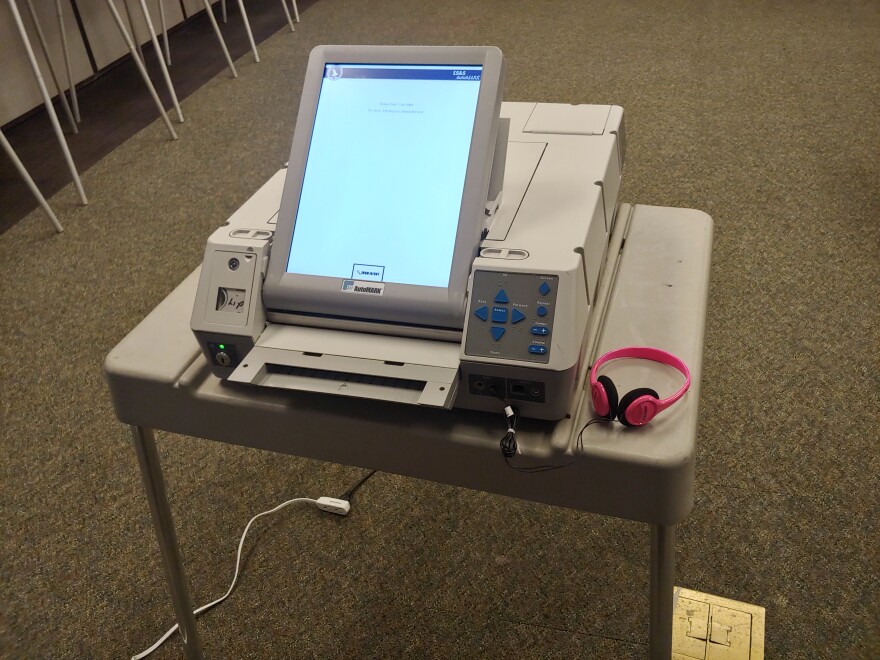Thousands of people with disabilities are hoping to vote in Wisconsin on Aug. 11, in November, and in many other elections in the years ahead. But advocates say people in wheelchairs, the visually impaired, and people with other concerns have a more difficult time exercising their right to vote. Technology is helping ease some problems, but not all.
For those still going to the polls, voting locations are supposed to offer something like the AutoMARK machine. The AutoMARK, and other models like it, are for people who are visually impaired or for some other reason are not able to mark their ballot. Braille on the keyboard aids some, or they can get audio instructions over a headset, on how to electronically make their candidate choices.
Bill Koller was chief inspector at a February polling place at Independence First in Milwaukee. He says the machines are important.
"Sometimes, a person who's visually impaired, if they come in, a lot of times there's someone with them who can assist them. But if they don't [have someone else along,] they can utilize this to cast their vote,” Koller told WUWM.

But due to the COVID-19 pandemic, Independence First says it won't be a polling place on Aug. 11 or in November. So, people who need the AutoMARK or another device will have to go elsewhere.
Some of the machines elsewhere may not be working or set up, says Denise Jess. She's part of the Wisconsin Disability Vote Coalition. Jess also says some places may not be physically accessible to all voters.
"There are still stairs or narrow passageways, narrow doorways, lack of elevator lifts. The things that would allow a voter to successfully get to and through a polling place to be able to cast their ballot,” Jess said at a recent news conference.
Of course, due to COVID 19, many people are staying home this month and voting absentee — or trying to.
Jess is also CEO and executive director of Wisconsin Council of the Blind and Visually Impaired. She says the state doesn't have an absentee option that complies with the Americans With Disabilities Act.
"I receive a paper ballot in the mail, just as every Wisconsinite does, and I cannot see that ballot to be able to mark it independently and privately. I'm dependent on asking a family member to do that for me,” Jess said.
Jess says she trusts her family to mark the ballot according to her wishes. But she says that's not true in all households.

Harvey Ross, who works at Independence First and uses a wheelchair, says his absentee ballot didn't arrive before the April election, and his only option for voting was going to the polls.
"So literally, I had a choice to make, and the choice I made was, I didn't go,” Ross said, citing health concerns for himself and his elderly mother.
Ross says he worries people who don't get their absentee ballot will skip voting on Tuesday.
Barbara Beckert, of Disability Rights Wisconsin, says the election day accessibility audits her group usually does for the state have been put off during the pandemic. She urges voters with disabilities who cast ballots in person on Tuesday to report problems that could maybe be fixed by November.
"We would like to hear about it, and the [Wisconsin] Elections Commission would like to hear about it. They recently added an option on their complaint page, which is specifically for accessibility-related complaints,” Beckert said.

Beckert says her group is also currently in federal court seeking to have Wisconsin ordered to create an accessible absentee voting option. She says the case also pushes for more reliable curbside voting. A hearing on the case took place on Wednesday.
Beckert also says with many state drivers license offices on limited schedules the last five months, it's been tougher than ever for people with disabilities to get the photo ID they need to vote.
A spokesperson for the Wisconsin Elections Commission says staff will continue meeting with advocates and respond to their concerns.
Support for Innovation reporting is provided by Dr. Lawrence and Mrs. Hannah Goodman.

Do you have a question about innovation in Wisconsin that you'd like WUWM's Chuck Quirmbach to explore? Submit it below.
_




